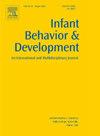Maternal parenting skills, adverse clinical outcomes, and contextual factors in low-income families: Associations and predictors of the neurodevelopment of preterm children in the first two years of life
IF 1.9
3区 心理学
Q3 PSYCHOLOGY, DEVELOPMENTAL
引用次数: 0
Abstract
Background
Preterm children are a risk group for neurodevelopmental delays, while interactions with their mothers may serve as a protective factor.
Aims
The objectives of this study were to (1) identify changes in preterm children's neurodevelopment, maternal skills, and mother-child interactions of preterm children from the first to the second year of life; (2) analyze differences between preterm children with and without developmental delays in relation to social skills, parenting skills, and mother-child interaction; and (3) examine the risk and protective factors associated with the neurodevelopment of preterm children.
Methods
Participants included 47 Brazilian preterm children and their mothers, assessed at the first (Mage/months = 10.4, SD =3.6) and second (Mage/months= 26.2, SD=8.5) years of life, using corrected age. The Bayley Scale of Infants and Toddler Development -III and the Interaction Rating Scale were used for assessment.
Results
Cognitive and language scores decreased from the first to the second year of life, while children's motor and social skills, parenting skills, and mother-child interactions remained stable. In the second year of life, neurodevelopmental delays were associated with lower social skills, reduced parenting skills, and less evident mother-child interactions. Significant factors influencing child neurodevelopment in the first year of life included the number of children at home, NICU stays, maternal age, and parenting practices that foster cognitive growth. In the second year, neurodevelopment was primarily influenced by mother-child interactions and breastfeeding. Additionally, the number of children at home, child autonomy, responsiveness to the mother, breastfeeding, and family income were predictors of neurodevelopment in the second year.
Conclusion
The results underscore the importance of enhancing mother-child interactions and parenting skills to promote neurodevelopment in premature children. The findings provide valuable insights for intervention programs targeting social skills, aimed at fostering positive peer interactions and facilitating social integration among children with developmental challenges.
低收入家庭中母亲的养育技能、不良临床结果和环境因素:早产儿头两年神经发育的相关性和预测因素
背景早产儿是神经发育迟缓的高危人群,而与母亲的互动则可能成为保护因素。目的本研究的目的是:(1) 确定早产儿从出生后第一年到第二年在神经发育、母性技能和母婴互动方面的变化;(2) 分析有发育迟缓和无发育迟缓的早产儿在社交技能、养育技能和母婴互动方面的差异;(3) 研究与早产儿神经发育相关的风险和保护因素。方法参与者包括 47 名巴西早产儿及其母亲,在出生后第一年(Mage/月=10.4,SD=3.6)和第二年(Mage/月=26.2,SD=8.5)进行评估,采用校正年龄。结果从出生后第一年到第二年,儿童的认知和语言得分有所下降,而运动和社交技能、养育技能和母子互动则保持稳定。在出生后第二年,神经发育迟缓与社交能力下降、育儿能力降低和母婴互动不明显有关。影响出生后第一年儿童神经发育的重要因素包括家中孩子的数量、新生儿重症监护室的住院时间、母亲的年龄以及促进认知成长的养育方式。第二年,神经发育主要受母婴互动和母乳喂养的影响。此外,家中儿童数量、儿童自主性、对母亲的响应度、母乳喂养和家庭收入也是第二年神经发育的预测因素。研究结果为针对社交技能的干预计划提供了宝贵的见解,旨在培养积极的同伴互动,促进发育障碍儿童融入社会。
本文章由计算机程序翻译,如有差异,请以英文原文为准。
求助全文
约1分钟内获得全文
求助全文
来源期刊

Infant Behavior & Development
PSYCHOLOGY, DEVELOPMENTAL-
CiteScore
4.10
自引率
4.80%
发文量
94
期刊介绍:
Infant Behavior & Development publishes empirical (fundamental and clinical), theoretical, methodological and review papers. Brief reports dealing with behavioral development during infancy (up to 3 years) will also be considered. Papers of an inter- and multidisciplinary nature, for example neuroscience, non-linear dynamics and modelling approaches, are particularly encouraged. Areas covered by the journal include cognitive development, emotional development, perception, perception-action coupling, motor development and socialisation.
 求助内容:
求助内容: 应助结果提醒方式:
应助结果提醒方式:


